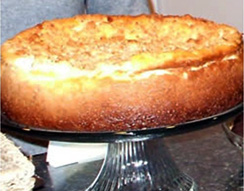Passover Symbolism Through the Lens of Addiction and Recovery
By Hannah Prager
“Egypt is not just a geographical place. Egypt is a state of being. It’s a state of mind.” said Rabbi Mendy Lipskier. When we celebrate Passover, there is a commandment for us to see ourselves as if we’re leaving Egypt today. Egypt, or Mitzrayim, comes from m’tzarim, meaning narrow, constricted, or boundary. “We all have to break out of those boundaries. For some it’s the constraints of addiction. For others, it’s fear, anxiety, or depression, but we all have issues that we have to deal with and break free of. Every day we have to leave our own Egypt.”
A blessing is said which thanks G-d for performing miracles for our ancestors in those days at this time. What does that really mean? Rabbi Yosef Lipsker, certified addiction counselor, teacher, and radio host, said this is not just a day to reflect on. “We are repeating and remembering. The actual deeper meaning is it happened then, but it’s also happening now. Right now, we are going through the story and miracle of Passover, and the trials and tribulations that come along with that, and then we move onto the redemption.”
As we live through this energy of moving from slavery to freedom, let’s visit the symbols and opportunities of Passover through the lens of addiction and recovery.
*Please note throughout this article, “Lipsker” refers to Rabbi Yosef Lipsker of PA, and “Lipskier” refers to Rabbi Mendy Lipskier of AZ.
Slavery
“What is a slave?” began Lipskier. “Someone who doesn’t have the freedom to do what they want to do. They are beholden to a master. They cannot decide when they want to go to sleep, wake up, what profession to go into, they have to do whatever their master says they must do. That’s what the Jews experienced in Egypt… Any recovering addict will definitely confirm that when in addiction you are a slave to your addiction, to your substance [or behavior] of choice, whether that’s alcohol, pornography, gambling, or drugs, your entire life is consumed by that addiction. That addiction is going to dictate to you when you go to sleep, if you go to sleep, who you hang around with, perhaps even how you dress, what kind of job you get, whether you keep that job… it is a sort of slavery to that addiction.”
Denial
“Another form of slavery is a lack of acceptance of what’s going on in one’s life.” said Rabbi Dr. Chaim Meyer Tureff. He said the 12 Step Program discusses how acceptance is a key to happiness; acceptance of a situation, of other people and their choices, of being cut off in traffic, etc. He said mindfulness conversations often include the idea of control, and that the only things one can control are their emotions and the way they respond to a situation.
Tureff has heard parents complain “my child made me angry.” He said, “nobody can make you angry.” Although it can be difficult not to do, giving someone else power over our emotions is a form of self-enslavement. Like Eleanor Roosevelt said, “No one can make you feel inferior without your consent.”
Lack of acceptance is similar to denial, a common symptom of addiction. This form of slavery can look like the “constant inability to stop something, or the inability to see that what you’re doing is detrimental” said Tureff. How can we escape our own Egypts if we do not recognize or admit they are narrow or limiting places?
Slavery might be less noticeable when the behavior is seemingly positive, like working or praying. Lipsker said, “If someone goes to synagogue and prays, it’s a beautiful thing. But if he’s praying for six or seven hours a day and doesn’t come home to his family, that’s a severe addiction that needs to be treated. Even things that sound good and holy, they’re not holy if they’re tainted with addictive behavior. It all has to be balanced.”
Separately, as slavery was a societal issue, learn more here about how the American addiction crisis is a societal failure, not a personal failure.
Pharaoh
Pharaoh represents ego, the master of slavery, of our own personal Egypts. Lipskier said, “[it is ego,] this sense that I cannot let go, the only thing I have is control, that holds us back from being free.” The nature of ego is cyclical, making its influence more challenging to break free from.
“I like to joke that Pharaoh himself was an addict,” said Lipsker. “He swore up and down he wouldn’t do another plague, and then he kept on relapsing with his behavior… he relapsed after the worst plague of all, the death of the first born. He still couldn’t stop himself, even though his life was in danger. He was about to be killed, and he knew it.”
Living in our personal Egypt, Pharaoh, or ego, is the strongest voice in the land. Tureff said, “When you’re actively in addiction, even the good things suck. Because you’re in it, you realize you still have that hanging over your head… For example, a good conversation with someone at the grocery store may end with thoughts like “if they really knew who I was, if they really knew what I was doing, if they really knew I was an addict, then they wouldn’t want to be having this discussion with me right now. They would see me as the piece of trash that I really am.”
Pharaoh’s Essence
One of the things G-d told Moses was come to Pharaoh, not go to Pharaoh. Lipskier said, “It’s an interesting choice of words, it’s as if G-d is saying I’m there already, now you come. In kabbalistic teaching, G-d was telling Moses you have fear of this tyrant Pharaoh, I’m there already. Face to face with him, you’ll learn who he really is.
Is he an evil tyrant? Yes, of course, but that is a symptom of something. If you want to know what he is at his core, it’s this false sense of pride, his ego, that’s all he is. He’s taking something that doesn’t belong to him, his G-d like power, and attributing it to himself. Once he does that, he gives himself permission to be a tyrant, to kill, and to do all those other things, but at it’s core it’s all fake. It’s all this false bloated ego.
It may be helpful for the addict to know; I’ll only really know who I am once I surrender. Once that fake ego gets out of the way I can meet my true self, and my true self is really one with G-d which is so powerful. [It takes courage to surrender, to let go of the] fake ego that will never let go of this sense of control.”
This is a reason why we rid our kitchens of bread. Bread symbolizes ego as it rises, and matzah symbolizes humility, no fluff. Once we let go of ego, we can see the essence of who we really are.
Moses
“Moses was a sponsor, basically” said Lipsker. The people might have thought we have G-d, we don’t need Moses, but “Moses was someone who was objective, and he was able to look at the situation and guide people.”
The failure of the golden calf is a misunderstood story because the people really felt that Moses may have been a problem, they wanted to have something that can’t talk back, something static, but that’s addictive thinking. No one should tell me what to do, I’ll create an object, this object will tell me what to do, but I don’t want anyone telling me what to do, looking at me, critiquing me.
They (who built the golden calf) were not necessarily bad, they were thinking this is the best thing. Like most people, they don’t think they’re doing something wrong, they think what they’re doing is perfect. But eventually, when you step back, you’re able to see the value of [an objective person] integrated into your life, and that’s why the idea of having a sponsor is so important. This is also an idea for those that don’t want recovery, for those people who need guidance.”
Freedom
Tureff said, “Being more present, being in the moment, it’s not easy, and that has nothing to do with addiction. I think for most people it’s difficult to be in the moment. It’s hard not to live in the past or in the future. Not being a slave is the ability to be in that moment.”
This relates to an idea in Derech Hamelech, Ushpizat Yitzchak, taught by Yiscah Smith. “Each person is obligated to see himself (as if he left Egypt) – if in fact he is present. For if he has already come out of Egypt, and he experiences life through the lens of presence, there is no longer the need to be in exile, in order find pieces of his soul. For the state of being in exile is only when a person is not present.”
The Challenge of Freedom
Lipsker said, “Passover is not only talking about the idea of freedom, but the idea of the challenge of freedom. When the Jewish people came out of Egypt, they were free. All of a sudden they get the Torah, all these rules, regulations, and responsibilities. You can’t do this, can’t do that, should go here, shouldn’t go there… but those are actually tools, it’s hard work to be free, it’s not always easy. Doing recovery is not easy. Every single day you have to get up in the morning, and you have to find yourself again. Every day it’s a new day, one day at a time. It’s something that we have to integrate into our life in Judaism.”
“Freedom is something that sometimes we don’t even know we want.” The experience of being free can feel so different or burdensome, that the acclimation can be difficult. “[The Jewish people] didn’t know what freedom meant, in fact, they were clinging to their slavery, even after they left Egypt. They said let’s go back, that was a better life for us. We see that as a common theme in today’s modern society. When you have someone in jail for 20 years, many times those people are more comfortable in jail than they are being free.”
Intentional Freedom
Tureff said, “According to our tradition, we didn’t build the pyramids, or anything like that. A lot of the work that we did was for not. Sometimes we would build things on foundations that couldn’t hold what we built, so it would just be destroyed, which tears somebody… even if you’re in a dire situation, if you feel like you’re accomplishing something, a task, whatever that task is, there is an innate feeling that we have of accomplishment. When it’s for absolutely nothing and there’s no purpose, it breaks our will.”
Therefore, the opposite of slavery is not the ability to do anything, but the ability to do something meaningful; to contribute. This is also why we eat the matzah and maror together. Here matzah symbolizes freedom and maror symbolizes servitude. The highest freedom is attained when it is channeled in service of a purpose greater than ourselves.
Matzah
When we break the matzah, we remember the breaking point of the Jewish people. Moses had asked Pharoh to let them go, a flicker of hope. Pharoh then responds by assigning them more intensive labor. This was too much to handle. “There was one last straw that G-d was waiting for to break the camel’s back… When the Jews were so demoralized, so broken, completely surrendered, at that point G-d can now say now I’m able to take them out of Egypt.” said Lipskier.
Lipsker said, “Sometimes you have to be broken. I see it every day. People when they’re broken, all of a sudden you can reach into the heart, because they have a shell around them. It’s the idea of breaking something and allowing penetration, allowing people to enter into your sphere. The toughest people I see, people that are lawyers, doctors, leaders, they never open up about their own personal challenges, here you see brokenness gives them the chance to feel vulnerable and that vulnerability is a good thing. It’s a time to be open.”
Lipskier said, “It’s only when a person reaches rock bottom that surrender becomes an option, and there’s no other option. There are two ways a person can hit rock bottom. One is through humiliation, and the other humility. So with the Jewish people in Egypt, it happens through humiliation. For many addicts it happens to be humiliation… It all boils down to my bottom, where’s my bottom going to be? Am I willing to lift the bottom up just enough to find the courage to surrender now [with humility] or do I need G-d to really push me into the gutter and feel that urgency with humiliation?”
Seder
Lipsker said, “Passover is perfect to compare to recovery, it’s going from addictive thinking to otherwise.” The process of the seder represents the process of moving from slavery to freedom, physically, mentally, emotionally, socially, and spiritually. After trauma such as slavery, addiction, or being in any personal Egypt, therapeutic treatment modalities are required for each of these categories to move one through a healing process.
“There’s not one thing in the 12 steps that doesn’t combine with Judaism, or the seder… Admitting to what we were, we were slave mentality, we were slaves, that is a recognition. Recognizing a higher power, being willing to transform ourselves, that’s all about recovery” said Lipsker. “Judaism believes everyone has a pathway to recovery. Everyone has a pathway to repentance. If you read the prayers on Yom Kippur, there are so many sins, who gets forgiven for those sins? We do. G-d has room for us all. We need to have room for people as well.”
Process
Lipsker said, “It’s very important to understand the idea of process as well. [G-d could have given us the Torah as soon as we left Egypt, but we weren’t ready yet.] You need to go through that process, you need to go through steps. Whether it’s 49 steps or 12 steps, there’s a process.” Instant gratification is part of an ego mindset, and process is part of a freedom mindset.
Process is also related to reaching a certain idea on your own. “I’ve seen many people who, nothing changed them until they made a conclusion in their mind. The pain didn’t change them, the suffering didn’t change them, the loss didn’t change them, the consequences didn’t change them. It was only when they realized in their own heart and mind that they need to change, that was the end of their addiction and the beginning of their recovery.”
Beginning the process of redemption can be overwhelming. Did you know less than 20% of the Jewish people actually left Egypt? “How many actually came into the land of Israel 40 years later? Less than 1%! That doesn’t sound so incredible, but it’s the reason you and I are here” said Tureff.
What kept the 80% from leaving? “The fear of the unknown. I realize that it’s detrimental that I’m a slave in Egypt, it’s awful, but I know what I’m getting. Sometimes knowing what I’m getting [feels] better than the unknown.”
Daily Exodus
Lipsker said, “Every single day we have to remember the exodus from Egypt. The reason is every single day, we have to get up and begin the process of recovery again, the process of redemption.”
“In a joking way, I’ll tell you a story. I once said to myself, I’m going to release myself from any resentments I have. I decided I’m getting rid of resentments. And then I started a fresh day, I got up in the morning, I’m all clean, all ready to take on the work, by 11:00 in the morning I already have 25 new resentments. Our MO is always looking for why didn’t this person do this, why didn’t this happen that way… so you can’t say I’m going to just do it, I’m going to get rid of my problems, and then I’m all free. Like a diet, every single day, you’ve got to do it.”
Telling the Story
Lipskier said, “When we sit down at the seder table hopefully with family and friends we’re not just going to share our shared history as a people, but a personal experience, where G-d took me out of my own Egypt. And when I can be vulnerable at my seder table, that’s the greatest thing I can do for my fellow Jew who may be suffering silently, who doesn’t know that this is something that everyone deals with on some level. But if I’m willing to share my story of liberation from bondage at the seder table, that will allow someone else to find the courage for some humility, and to surrender and find their own redemption… May we find a deeper level of freedom every year.”
Chag Sameach!
 Hannah Prager is the Community Relations Specialist for Soberman’s Estate, and a volunteer for Moishe House. Soberman’s Estate is a treatment center for men with alcoholism, substance use disorders and co-occurring issues, and provides kosher food accommodations and rabbinical support. To learn more or for personalized resources, call the Admissions Director at 480-595-2222 or visit www.SobermansEstate.com
Hannah Prager is the Community Relations Specialist for Soberman’s Estate, and a volunteer for Moishe House. Soberman’s Estate is a treatment center for men with alcoholism, substance use disorders and co-occurring issues, and provides kosher food accommodations and rabbinical support. To learn more or for personalized resources, call the Admissions Director at 480-595-2222 or visit www.SobermansEstate.com






